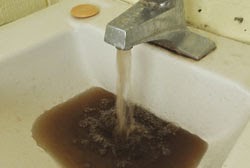Wisconsin has over 220 dairy concentrated animal feeding operations, CAFOs, and according to the Department of Natural Resources there are about 30 more applications pending. CAFOs are required to obtain a Wisconsin Pollutant Discharge Elimination System permit every five years once they reach the level of 1,000 “animal units,” or about 700 dairy cows.
Kewaunee County, near Green Bay, has 14 permitted CAFOs, giving it one of the highest livestock densities in the state.
In March 2012, Kinnard Farms, in Lincoln township in Kewaunee County, applied for a reissuance of its WPDES permit and proposed to construct new facilities that would allow it to more than double its herd size to 6,200 cattle. This number of cattle would produce over 70 million gallons of manure per year without, according to Kinnard Farms, any pollution of ground or surface water.
Impacts on the community such as noise, odor and dust damage to public highways do not need to be considered in the permitting process.
WPDES permits are supposed to protect the public. I would assume they are in keeping with the mission of the DNR to protect and enhance our natural resources, including our air, land and water; wildlife, fish and forests and the ecosystems that sustain life.
But a permit is only as good as the legal enforcement. Kinnard Farms had a history of permit violations: three notices of noncompliance for land-spreading violations, as well as a 2010 notice of violation for its overflowing manure lagoon. Still, the DNR issued the permit for Kinnard’s expansion based on incomplete information as to how Kinnard Farms planned to clean up its act.
In October 2012 neighbors of Kinnard Farms filed a petition requesting the DNR to review the permit, challenging the DNR’s issuance of a permit before the expansion plans were completed, noting that there was no limit placed on the number of cows at the dairy and no provision stipulating monitoring wells. The permit could not ensure that storage facilities and land-spreading would not result in runoff events that would pollute surface and ground water.
Kimberlee Wright, spokeswoman for Midwest Environmental Advocates, noted that while the DNR has “some very good men and women who care about Wisconsin’s water, they are very understaffed and they are under horrible political pressure to issue permits.” She also noted that there was only one person in the state dealing with CAFO permits and no staff to monitor permitted facilities.
The petitioners were asking only that laws already on the books be enforced. Midwest Environmental Advocates attorney Sarah Williams stated that “the petitioners are not trying to get rid of CAFOs, they’re not trying to stop this industrial dairy from expanding, what they want is a permit that protects their water and health.”
During the February case hearing, public testimony noted that 50 percent of the private wells tested in Lincoln township, and 30 percent of the private wells tested in Kewaunee County, were contaminated with E. coli and other contaminants. Residents cannot use water from their wells for drinking, cooking or bathing.
In his Oct. 29 decision, Judge Jefferey Boldt ordered Kinnard Farms to begin groundwater monitoring for pollutants at the building site. He ordered no less than six monitoring wells, two of which must monitor off-site land-spreading of manure. It was also ordered that a maximum number of animal units at the facility be noted on the permit.
The DNR was ordered to modify the Kinnard Farms permit to limit discharge of manure or wastewater pollutants to navigable waters.
If, as spokesman Lee Kinnard stated, Kinnard Farms is “very committed to being responsible stewards of those resources” and “passionate about being responsible farmers,” why didn’t they put the petitioners’ requests in place two years ago?
Why didn’t the DNR undertake a more thorough permitting process initially? Government agencies should not have to be forced by citizens to enforce the law.
In a state where “moving forward” means getting bigger, the environment and public health always seem to trumped by someone needing to increase their profits. We are told that economic survival depends on growth, no matter what business you are in. Personally, I don’t agree.
There is something seriously wrong with society if profit for a few is put ahead of public health.
And when the government refuses to enforce laws protecting the public, then there is something seriously wrong with the government.

